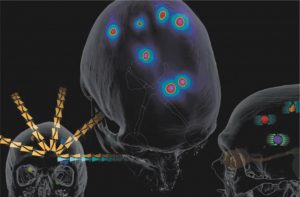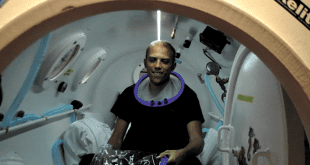 Dr. Nitesh Paryani helps cancer patients during one of the most difficult times of their lives. As a radiation oncologist at St. Joseph’s Hospital, he provides care that aims to identify and treat cancers as quickly and effectively as possible.
Dr. Nitesh Paryani helps cancer patients during one of the most difficult times of their lives. As a radiation oncologist at St. Joseph’s Hospital, he provides care that aims to identify and treat cancers as quickly and effectively as possible.
Informed by his family’s nearly 60-year history of treating cancer patients in Florida, Dr. Paryani’s practice offers traditional, patient-oriented service alongside the latest technologies. It’s how his uncle ran his practice, and his grandfather before that. Think of it as a mom-and-pop shop with cutting-edge equipment.
“We have a true understanding of the history of cancer treatment,” said Dr. Paryani, a third-generation radiation oncologist. “That includes incorporating modern technologies and advancements in the field. From new diagnostics to therapeutics—there’s always an opportunity to learn.”
Dr. Paryani uses BrainLab, an innovative technology that allows him to deliver complex radiosurgery for tumors in the brain. Radiosurgery allows for patients to undergo treatment for cancer in the brain without the invasiveness of a traditional surgery. The technology allows his team to identify the precise location of brain tumors and target radiation on those spots, limiting the negative impacts on healthy tissue surrounding the tumor.
“One of the big benefits of BrainLab is it allows us to be very precise in our imaging from every angle of radiation we deliver,” he said. This can shorten treatment times and improve outcomes because “the longer a patient is lying on the table, the longer they have a chance to move, and the more potential for the target to be missed.”
BrainLab is an innovative technology that allows physicians to deliver complex radiosurgery for tumors in the brain.
The technology helps treat patients significantly faster than conventional approaches, Dr. Paryani said.
Earlier this year, neurosurgeons at St. Joseph’s Hospital approached Dr. Paryani about using BrainLab to help treat patients with complicated brain conditions. Previously, many patients with arteriovenous malformation (AVM)—abnormal blood vessels that can lead to brain bleeds and can be difficult to treat—had to leave the area for treatment. By combining medical imaging and radiation therapy planning, Dr. Paryani uses BrainLab to treat AVM through radiation therapy.
“We knew this technique could be utilized to treat AVM, and that it provides sophistication and enhanced accuracy,” Dr. Paryani said. “Our neurosurgeons wanted an option to treat these patients at St. Joseph’s Hospital. We made that happen.”
Beyond BrainLab, Dr. Paryani has recently deployed other new technologies to improve treatment for cancer patients. A technique called respiratory gating allows his team to track tumors as the patient breathes, maximizing their ability to target the cancer while minimizing risk to surrounding tissue. And a new prostate radiosurgery program uses a protective hydrogel called SpaceOAR, which allows his team to treat patients with low-risk prostate cancer in just five days—significantly reducing the standard six- to nine-week treatment for prostate cancer.
“The field of radiation oncology is constantly changing,” Dr. Paryani said. “There are always new treatments coming out. Incorporating these treatments into my practice ensures patients get the highest quality care possible.”
A tenant guides Dr. Paryani’s practice: Never turn away a patient. It’s a mantra instilled in him by his uncle and grandfather, the latter of who died from a rare spinal tumor that was caused by radiation, back before radiation safety protocols helped protect doctors from being exposed to radiation when treating patients.
That’s why cancer is not just a professional concern for Dr. Paryani. It’s a personal concern for his family, and one of the reasons he insists on offering the personalized care and cutting-edge treatments that make his practice stand out.
“Every patient is unique,” Dr. Paryani said. “They all have their individual differences that require special attention. We strive to provide that every day.”
 Central Florida Health and Wellness Magazine Health and Wellness Articles of the Villages
Central Florida Health and Wellness Magazine Health and Wellness Articles of the Villages


